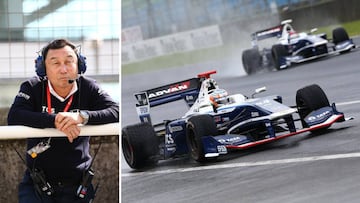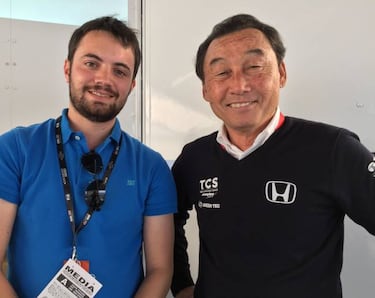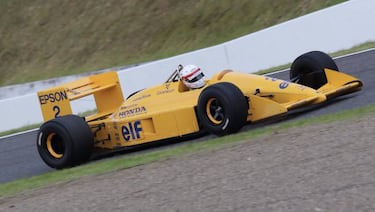"In my time Formula 1 was more of a driver’s race"
Satoru Nakajima, the first Japanese driver to compete in Formula 1, sat down with AS to discuss the future of the sport and the possibility of a Japanese champion.

Satoru Nakajima was the first Japanese driver to compete full time on the Formula 1 circuit, competing for Lotus alongside Ayrton Senna and Nelson Piquet in the late 80s before joining Tyrrell. Among his 74 starts in F1, fourth-placed finishes at the British Grand Prix in 1987 and the Australian Grand Prix in 1989, where he also recorded the fastest lap time, are among the highlights of a career that includes two participations at Le Mans with Toyota and seven Japanese Formula 2 championships.
Nakajima runs his own racing team, which competes in the national Super Formula Championship and Super GT with his drivers Narain Karthikeyan and Takuya Izawa. His two sons also race. Kazuki, who raced for Williams F1 in 2008 and 2009 and won this year’s 24 Years of Le Mans, currently leads the standings in the WEC Championship alongside Fernando Alonso. Daisuke, the younger brother, competes in Japan.
It's impressive to see crowded circuits at Japanese championships such as Super Formula and Super GT. What does motorsport mean for Japan?
In Japan you have a very strong industry, centralized, in a very small area. Naturally, the Japanese manufacturers are now involved in F1, such as Honda, or WRC and WEC, like Toyota. It's a way for them to expand themselves on the global market, but they still have a domestic presence which is essential. For sure that interaction between Japan and the other markets, the other drivers, the fans, is a very good mechanism for keeping the local manufacturers racing in Japan.
Last year Takuma Sato won the Indianapolis 500 and this year Kazuki Nakajima won Le Mans, but there are no Japanese drivers in Formula One at the moment.
If I look back on my own period in 80s and 90s, for the drivers and for the constructors, there was a big drive to push themselves onto the global platform. The next step in our progress on the driver's side is to take them up another level to make sure they are competing on the global stage. In Spain, you have Alonso, he became world champion, but in Japanese racing we haven't had that Japanese driver fighting to be world champion yet. There are a selection of Japanese drivers nowadays competing in Europe, some of them in Formula 2. If they take the opportunity, I’m sure they’ll push the level of Japanese motor racing forward. And we have to make sure they have Super Formula as well as the other Japanese racing series to build that platform, to give the drivers the experience and skills so we can produce a world champion in the future; that's the idea and that’s what we want to see.
You were part of a different Formula One during the 80s and 90s. What kind of differences do you see from the drivers' point of view compared to then?

"We want to see a Japanese champion in the future"
Satoru Nakajima
I suppose one thing you can say about the difference between F1 at my time and nowadays is related to the advancements in technologies and all the changes we see. Back in the 80s or the 90s you could really see the characteristics and the personality of the driver inside the car. And now, I'm not saying it's better or worse, but you see less of the characteristics of the driver when he is racing. In the past, it was easier to see that personality during the race. It's a bit of a comparison between an analogue race and a digital one. From the driver’s perspective, there hasn’t been a huge change; they still want to give their best to win. In my time it was more of a driver’s race and now it's very much a team competition.
Next year, Honda will be Red Bull and Toro Rosso's engine supplier. What are your thoughts about this alliance?
I can see huge benefits in this collaboration between Honda and Red Bull. With one team and two cars there were limitations, but now you have two teams and four cars so you can work on different setups, different problems, and work to find solutions at a much faster pace and in a more efficient way. It's going to be a huge benefit for Honda and for the competition.
Related stories
The automotive industry is changing; electric and hybrid engines are not only the future but the present. How do you see motor racing evolving in the medium-term?
It's a very difficult question. We have already seen the effects of this in motor racing. Formula One is using hybrid engines, we have the full-electric Formula E and we have the hybrid again in Le Mans cars. It's not really a case where you have to say this is right or this is the best way to do it. Something that will never change is that motors port will provide a great platform for manufacturers to test their technologies. From my personal perspective, I like the mix of electrical engine and traditional engine so at least in the medium-term, they can coexist inside a racing car.

